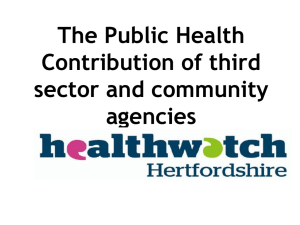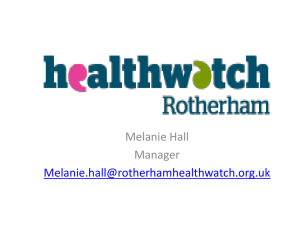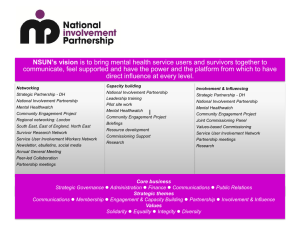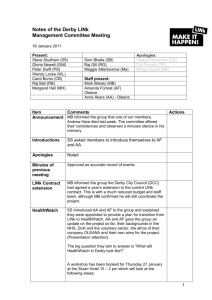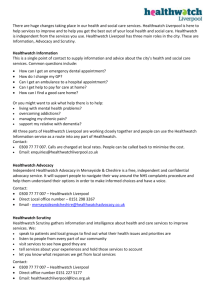Guidance for local Healthwatch on challenging Quality Accounts from NHS providers
advertisement
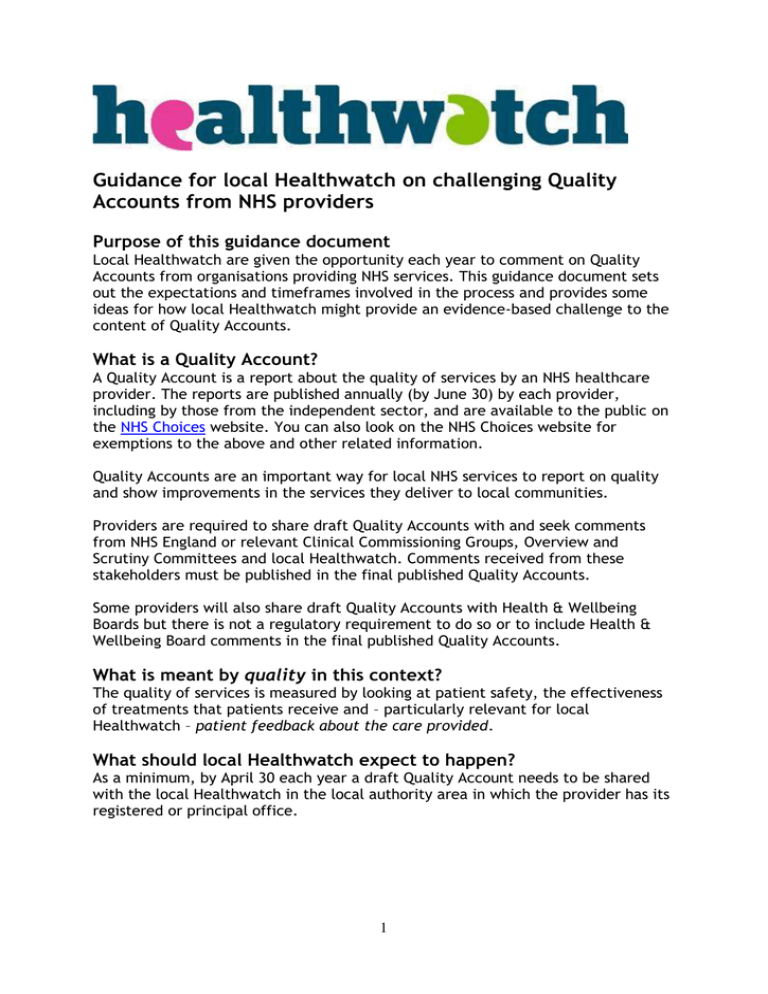
Guidance for local Healthwatch on challenging Quality Accounts from NHS providers Purpose of this guidance document Local Healthwatch are given the opportunity each year to comment on Quality Accounts from organisations providing NHS services. This guidance document sets out the expectations and timeframes involved in the process and provides some ideas for how local Healthwatch might provide an evidence-based challenge to the content of Quality Accounts. What is a Quality Account? A Quality Account is a report about the quality of services by an NHS healthcare provider. The reports are published annually (by June 30) by each provider, including by those from the independent sector, and are available to the public on the NHS Choices website. You can also look on the NHS Choices website for exemptions to the above and other related information. Quality Accounts are an important way for local NHS services to report on quality and show improvements in the services they deliver to local communities. Providers are required to share draft Quality Accounts with and seek comments from NHS England or relevant Clinical Commissioning Groups, Overview and Scrutiny Committees and local Healthwatch. Comments received from these stakeholders must be published in the final published Quality Accounts. Some providers will also share draft Quality Accounts with Health & Wellbeing Boards but there is not a regulatory requirement to do so or to include Health & Wellbeing Board comments in the final published Quality Accounts. What is meant by quality in this context? The quality of services is measured by looking at patient safety, the effectiveness of treatments that patients receive and – particularly relevant for local Healthwatch – patient feedback about the care provided. What should local Healthwatch expect to happen? As a minimum, by April 30 each year a draft Quality Account needs to be shared with the local Healthwatch in the local authority area in which the provider has its registered or principal office. 1 Timeframe The provider will usually seek to have a response from local Healthwatch within a month of sharing the draft Quality Account. Local Healthwatch should let providers know as soon as possible if they do not intend to provide a comment, so that this does not hold up the Quality Account’s publication. NHS Foundation Trusts have additional reporting requirements and earlier deadlines set by Monitor, and local Healthwatch might therefore expect drafts to be shared even earlier by these organisations. Regional providers An organisation providing services across a region, such as ambulance or mental health services, might ask the local Healthwatch in the local authority area in which the provider has its registered or principal office to co-ordinate comments from neighbouring local Healthwatch or lead on producing a joint comment. The approach to producing a comment Local Healthwatch produce comments on draft Quality Accounts on a voluntary basis. Comments should be no longer than 1,000 words in length. The Quality Accounts process is an opportunity for local Healthwatch to provide an evidence-based challenge to providers based on their own engagement with people who use NHS healthcare services. Good practice Local Healthwatch are best placed to provide meaningful comment on draft Quality Accounts where engagement with the provider on Quality Accounts, including co-design of the provider’s priorities for improvement, is a year round exercise. Providers are often proactive in seeking views from local Healthwatch on what quality priorities should be selected for a Quality Account several months before it is due to be published. Where this is not currently the case, local Healthwatch could themselves consider taking a proactive approach with the provider to build the necessary relationship to allow this to be the case in the future. Barbara Piranty, Chief Executive of Healthwatch Gloucestershire, explains: “What we have tried to do here is set up a meeting (separate to our regular quarterly meeting with providers) to informally discuss our feedback and their proposed priorities. This early engagement allows thinking on their part in terms of listening to the patient voice and using this to influence thinking before the draft becomes available.” 2 Mark Habibi, Volunteer Support Officer at Healthwatch West Sussex, adds: “Drafting an informed and balanced commentary will reflect favourably back on local Healthwatch but the converse is also true, so due consideration should be given to who will draft the comment and sign it off. Where a local Healthwatch has endeavoured to engage with a provider which has been consistently unresponsive, this is also potential material for comment.” The local Healthwatch challenge to Quality Accounts Questions to consider when providing comment on Quality Accounts include: Does the draft Quality Account reflect people’s real experiences as told to local Healthwatch by service users and their families and carers over the past year? From what people have told local Healthwatch, is there evidence that any of the basic things are not being done well by the provider? Is it clear from the draft Quality Account that there is a learning culture within the provider organisation that allows people’s real experiences to be captured and used to enable the provider to get better at what it does year on year? Are the priorities for improvement as set out in the draft Quality Account challenging enough to drive improvement and it is clear how improvement has been measured in the past and how it will be measured in the future? Quality Accounts Steering Group Healthwatch England has joined a Quality Accounts Steering Group, led by the Department of Health and involving partner organisations such as NHS England, Monitor, the NHS Trust Development Authority, the Care Quality Commission and the Health & Social Care Information Centre. This is an advisory group which will influence the Quality Accounts process moving forward. The Group is already clear that the current prescriptive framework for Quality Accounts does not allow providers the freedom to produce reports that are as publicly accessible as they might be. This is something the Healthwatch network will want to influence in the future as we believe that language and layout of Quality Accounts should be simpler to enable greater accessibility for the public. In the meantime local Healthwatch are encouraged to focus their challenge on the content of Quality Accounts rather than on the language used or the layout. Review date: end of March 2016 3
